Court Marriages vs Arranged Marriages in Pakistan: A Comparative Analysis
Court Marriages vs Arranged Marriages: Understanding the Role of Tradition in Pakistani Society
Marriage holds a pivotal role in the cultural and social fabric of Pakistan. Deeply rooted in tradition, the concept of marriage is not merely a union between two individuals but a binding force that unites families and communities. Historically, arranged marriages have predominated within Pakistani society, functioning as a means for families to form alliances, strengthen familial bonds, and maintain social status. This practice is based on the long-standing belief that elders possess the wisdom and experience to choose suitable partners for their children, guided by factors such as social compatibility, economic stability, and family background.
Court Marriages vs Arranged Marriages: Exploring the Shift Towards Individual Autonomy in Pakistan
However, in recent years, the landscape of marriage practices in Pakistan has started to shift. The younger generation, influenced by global exposure and shifting cultural paradigms, has shown a growing preference for court marriages. A court marriage, conducted under the legal framework of the country, enables individuals to choose their life partners based on personal compatibility and mutual consent, rather than familial arrangements. This trend signifies a departure from traditional norms, highlighting a movement towards individual autonomy and personal choice in matrimonial matters.
Court Marriages vs Arranged Marriages: How Education and Technology Are Redefining Marriage in Pakistan
The historical and cultural context of marriage in Pakistan sets a rich backdrop for understanding this shift. While arranged marriages still retain their stronghold and are respected for their cultural validity, the rise of court marriages reflects an evolving societal paradigm. These changes are influenced by various factors, including increased educational opportunities, greater awareness of individual rights, and the impact of media and technology. This growing trend towards court marriages signifies a broader social change, as it challenges conventional notions of duty, tradition, and familial roles within the institution of marriage.
Court Marriages and Arranged Marriages: Weighing the Pros and Cons in Contemporary Pakistani Society
This comparative analysis will delve deeper into both court marriages and arranged marriages, exploring their respective advantages, drawbacks, and the driving forces behind these matrimonial choices. Understanding this dynamic interplay between tradition and modernity provides valuable insights into contemporary Pakistani society.
Understanding Arranged Marriages in Pakistan
Arranged marriages have long been a cornerstone of Pakistani culture, embodying deep-rooted traditions and societal norms. Family and community play pivotal roles in orchestrating these unions, often with religious considerations guiding the process. The journey begins with families actively seeking potential matches for their children, often relying on social networks, matrimonial services, and community events to identify suitable candidates. Compatibility, family background, and socio-economic status are meticulously evaluated to ensure a harmonious match.
The Significance of Mangni in Pakistani Marriages: Tradition and Commitment
Once a potential match is identified, the formal process of engagement is initiated. This involves a series of interactions between the families to discuss the prospects of the union. The involvement of elders in these discussions underscores the respect for traditional wisdom and experience. Upon reaching mutual agreement, a formal engagement ceremony, known as ‘Mangni,’ is conducted. This ceremony symbolizes the families’ commitment to the alliance and paves the way for the wedding preparations.
Pre-Wedding Joy: The Importance of Mehndi and Dholki in Pakistani Arranged Marriages
Pre-wedding rituals form an integral part of the arranged marriage process. Customs such as ‘Mehndi,’ where intricate henna designs are applied to the bride’s hands and feet, and ‘Dholki’ nights filled with singing and dancing, add cultural richness and joy to the proceedings. These rituals provide a platform for both families to bond and celebrate the forthcoming union.
The Concept of Court Marriage in Pakistan
Court marriages in Pakistan represent a legal alternative to traditional arranged marriages, where two individuals can solemnize their union before a judicial magistrate. Unlike arranged marriages that typically involve family negotiations, court marriages are based on the mutual consent and choice of the couple. This type of marriage is governed by the Family Laws of Pakistan, ensuring that the union is lawful and recognized by the state.
Court Marriage Procedures: Legal Age, Documentation, and Witness Requirements
The process of court marriage involves several legal procedures and documentation. Firstly, both parties need to be of legal marriageable age, which is 18 years for women and 18 years for men. The couple must provide valid identification proof, such as CNICs (Computerized National Identity Cards). Additionally, an affidavit affirming their consent to marry, free of any undue influence or coercion, is required. This affidavit is accompanied by witnesses who also declare that the marriage is undertaken with the free will of both parties.
Legal Recognition of Court Marriages: The Marriage Certificate Explained
Once the affidavit is submitted, a simple ceremony is conducted in the presence of the magistrate, who then issues a marriage certificate, formalizing the union. This certificate holds the same legal weight as one emanating from a traditional arranged marriage, ensuring that the couple enjoys full marital rights and responsibilities under Pakistani law.
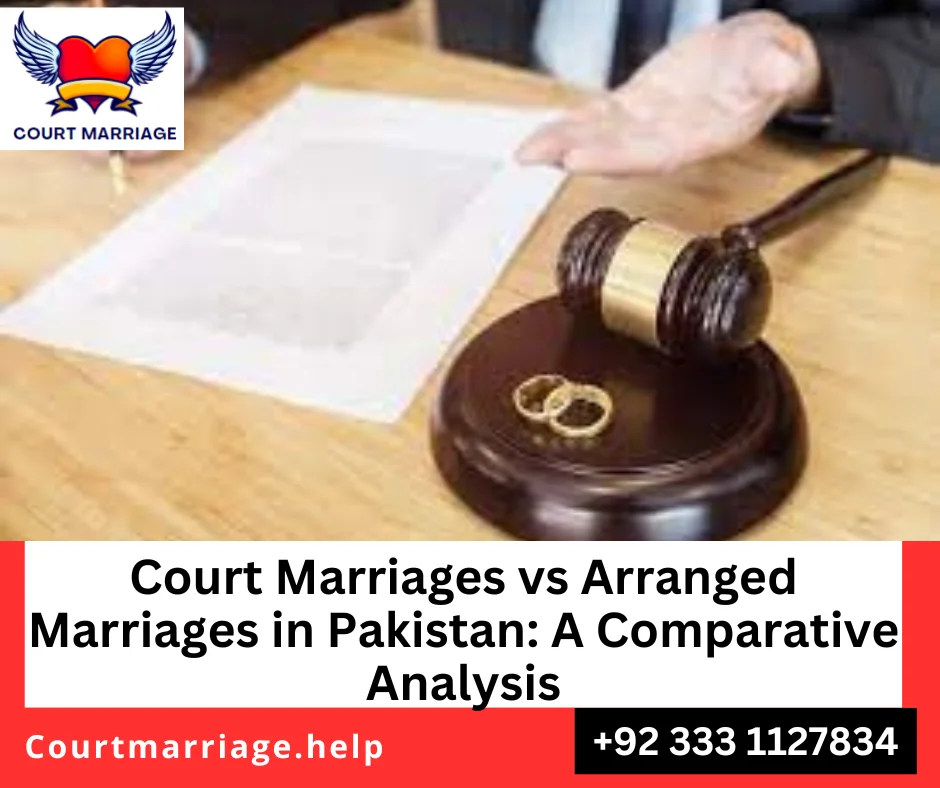
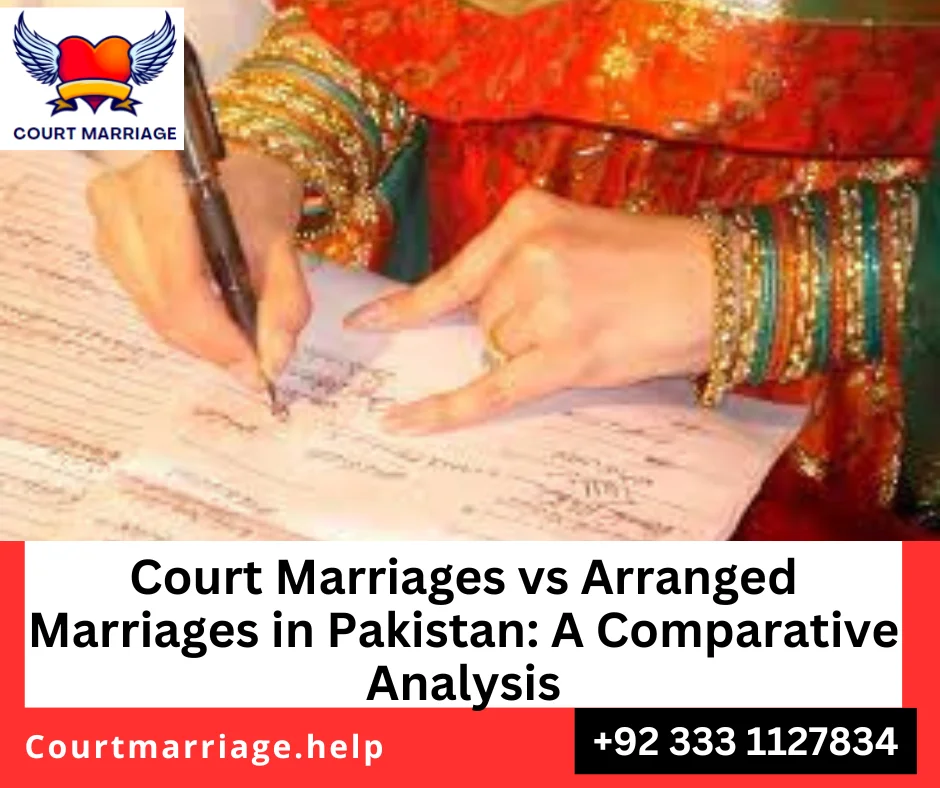
Court Marriages and Arranged marriages: A Shift Toward Individual Autonomy
Socially and culturally, court marriages often challenge the norms prevalent in Pakistani society. Arranged marriages have long been the traditional standards, usually orchestrated by families based on social, economic, and sometimes religious considerations. However, court marriages signify a shift towards individual autonomy and personal choice. They often face societal scrutiny and resistance, particularly in conservative circles where family consent is deemed paramount.
The Rise of Court Marriages: Embracing Independence in Urban Pakistan
Nevertheless, court marriages are gaining acceptance, especially among urban youth seeking to assert their independence. While they are still less common compared to arranged marriages, court marriages reflect an evolving narrative in Pakistani society, emphasizing personal freedom and legal protections in the realm of matrimony.
Court Marriages and Arranged Marriages: Legal Framework and Challenges
In Pakistan, the legalities surrounding both court marriages and arranged marriages fall under a well-defined framework primarily governed by the Muslim Family Laws Ordinance, 1961. This ordinance provides the legal foundation for marital unions, stipulating basic requirements such as the necessity of free consent, the presence of witnesses, and the registration of marriages. Whether a marriage is arranged or conducted in a court setting, compliance with these legal norms is mandatory.
The Role of Local Union Councils in Court Marriages: Procedures and Challenges
Court marriages, specifically, necessitate adherence to further procedures as outlined by the local union councils. Both parties must appear before a magistrate or a designated marriage registrar, providing documentary proof of age, identity, and free will. Court marriages can face significant legal challenges, particularly concerning the consent of the bride due to societal and familial pressures. Parental opposition is a common issue, often resulting in legal disputes or social consequences that test the robustness of the legal protections provided.
The Intersection of Tradition and Law in Arranged Marriages: Navigating Consent and Registration
On the other hand, arranged marriages, which are deeply entrenched in Pakistani culture, typically involve greater familial oversight and involvement. These marriages often benefit from pre-existing social structures and are generally seen as aligning with societal norms. However, they are not devoid of legal challenges either. Issues related to consent, especially coerced consent, can arise despite familial acceptance. The legal system tries to mitigate these issues through mandatory marriage registration and occasional judicial scrutiny.
Comparative Legal Protections: Court Marriages vs. Arranged Marriages in Pakistan
Both court and arranged marriages are subject to the same rights and protections under Pakistani law. This includes the right to maintenance, inheritance, and protections against domestic violence. However, the effective enforcement of these rights can vary significantly, influenced by social norms and the individual circumstances of each marriage. Legal recourse is available for grievances in both types of marriages, although accessing justice can sometimes be impeded by societal and familial pressures.
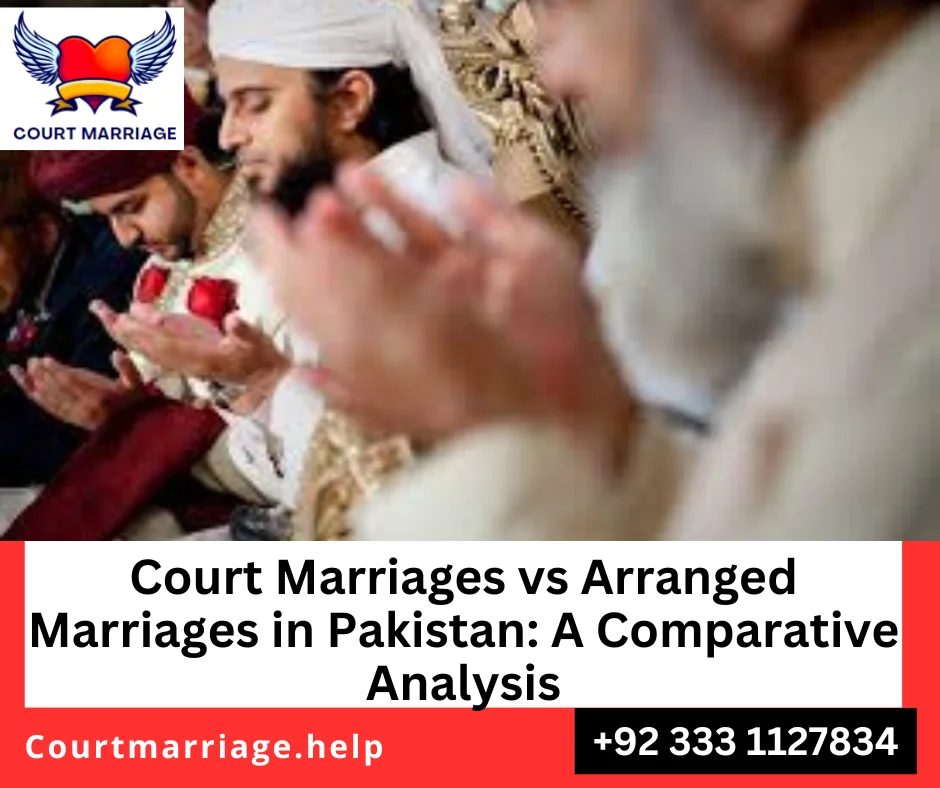

Social Challenges of Court Marriages in Pakistan: Navigating Skepticism and Disapproval
In contrast, court marriages in Pakistan, although legal and increasingly common, often come with their set of challenges in the social context. Families may initially react with skepticism or disapproval, particularly if the court marriage diverges from cultural or religious expectations. Such marriages are frequently viewed as a deviation from normative social practices, which can strain familial relationships. However, they also provide couples with the autonomy to choose their partners, aligning more closely with individualism and modern values.
Family Roles and Expectations in Arranged Marriages vs. Court Marriages in Pakistan
The expectations and roles of family members in arranged marriages are more predefined, fostering a sense of collective effort in the relationship’s success. Parents and extended family members often take an active role in conflict resolution and provide ongoing support. In court marriages, however, the couple usually navigates relationship challenges with less familial intervention, which can either strengthen their bond as they learn to resolve issues independently or exacerbate feelings of isolation if familial support is lacking.
How Arranged Marriages and Court Marriages Affect Social Standing in Pakistan
Social standing is another crucial aspect affected by the type of marriage. In arranged marriages, the alignment of family status and background tends to bolster the couple’s social standing. Court marriages may challenge this alignment, occasionally leading to social ostracism, but they can also pave the way for progressive social change by questioning traditional norms and championing personal choice.
Psychological Effects of Court Marriages Compared to Traditional Arranged Marriages
Court marriages and arranged marriages in Pakistan present distinct emotional and psychological experiences for the individuals involved. Each type of marriage comes with its own set of pressures and stressors that can shape the emotional well-being of the couple.
Emotional Pressures in Arranged Marriages: Balancing Familial Expectations and Personal Desires
In arranged marriages, the pressure to conform to familial and societal expectations is a significant emotional burden. Couples often feel the weight of upholding family honor and traditions, which can create substantial stress. The expectation to bond with a partner selected by elders can lead to initial discomfort and anxiety. Dr. Ayesha Khan, a renowned psychologist, explains, “The pressure in arranged marriages to meet familial expectations often overshadows personal desires, leading to suppressed emotions and potential resentment.”
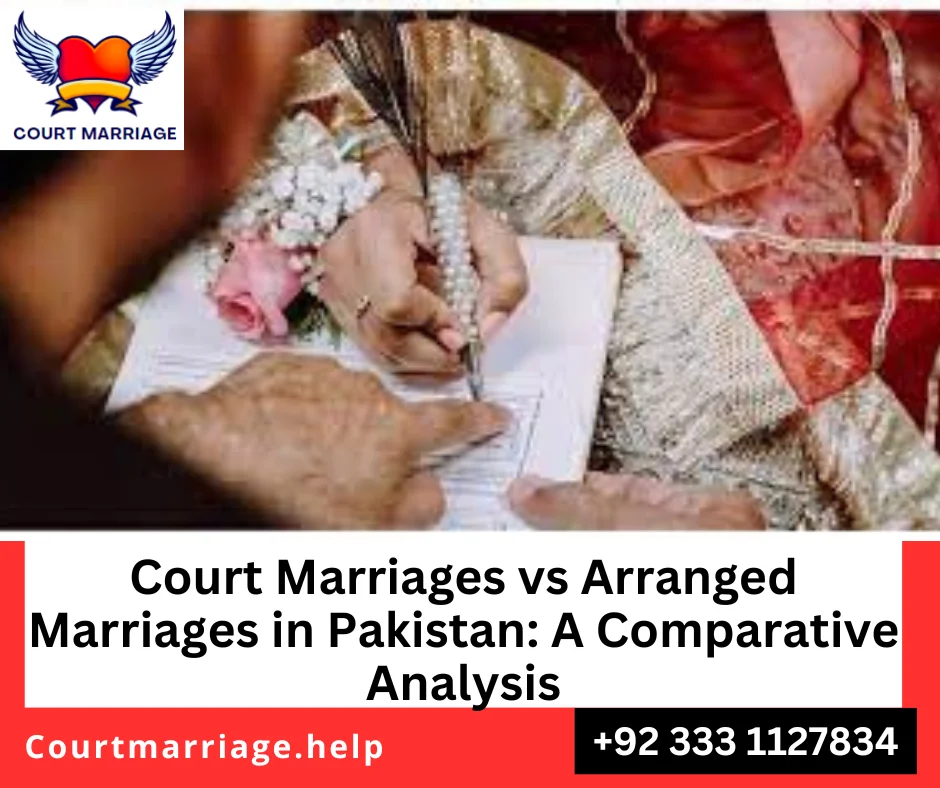
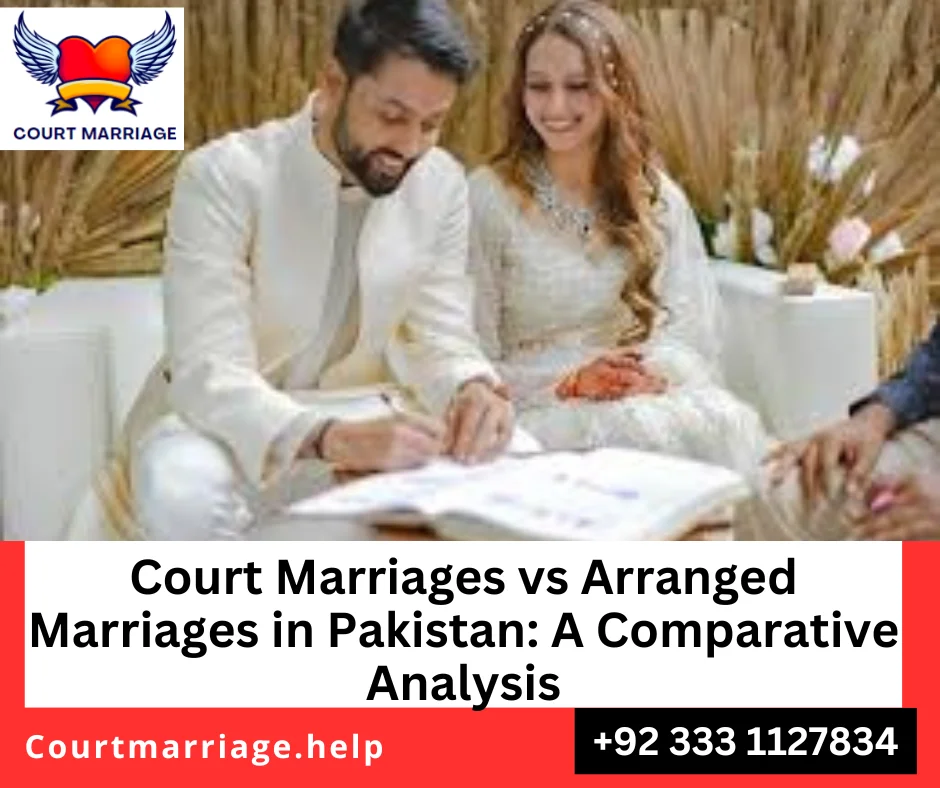
Handling Emotional and Psychological Pressures in Different Marriage Types
Both types of marriages require managing complex emotional landscapes. While the pressure to conform in arranged marriages can inhibit personal growth and create lingering dissatisfaction, the family conflict from court marriages can lead to isolation and emotional turbulence. It is essential for couples to seek professional guidance to navigate these pressures effectively. Integrating expert advice, open communication, and mutual support can help mitigate the emotional and psychological challenges unique to each marriage type.
The Financial Impact of Dowries in Arranged Marriages vs. Court Marriages
In Pakistan, marriage customs are intricately tied to economic factors, influencing both court and arranged marriages. While arranged marriages often carry significant financial burdens, court marriages tend to be more economical. A critical element in arranged marriages is the dowry, a practice where the bride’s family provides a substantial amount of money, property, or goods to the groom’s family. This tradition can place enormous economic pressure on families, sometimes leading to financial insolvency.
Financial Strain of Traditional Arranged Marriages: The Cost of Extravagant Weddings
Moreover, wedding expenses in traditional arranged marriages are typically high. Extravagant ceremonies that span several days, elaborate decorations, and extensive guest lists are common, pushing many families to go beyond their financial means. The emphasis on grandiosity can further strain resources, making the economic aspect a crucial consideration for many.
The Cost-Effectiveness of Court Marriages: A Simple and Affordable Alternative
In contrast, court marriages are known for their simplicity and cost-effectiveness. The court marriage process involves minimal legal fees and requires fewer formalities, making it a viable option for couples who prioritize financial independence. By avoiding the expensive rituals tied to arranged marriages, couples opting for court marriage can allocate their resources towards personal development, further education, or setting up a household.
Navigating Financial Pressures in Marriage: The Role of Economic Status in Arranged Marriages and Court Marriages
The economic status of families can also shape the choice of marriage. Wealthier families may prefer lavish arranged marriages to showcase their social status, while those with limited means may lean towards court marriages to avoid economic strain. It’s important to note that economic considerations are not solely about the immediate costs. Financial independence and long-term economic stability are also pivotal. Court marriages often empower couples to steer their financial future collectively, without the burden of fulfilling obligatory traditional practices.
Cost-Efficiency and Autonomy: The Economic Appeal of Court Marriages
Therefore, when comparing court marriages and arranged marriages in Pakistan, economic considerations play a significant role. Court marriages offer a pragmatic approach for those who seek an economical and autonomous marital pathway, while arranged marriages continue to be influenced by deeply ingrained cultural and economic expectations.
Difference Between Court Marriages and Arranged Marriages
The difference between court marriages and arranged marriages in Pakistan is a nuanced decision shaped by various personal, social, and cultural factors. Reflecting on the key points discussed in previous sections, it is evident that both types of marriages come with their distinct advantages and challenges. Court marriages offer the benefits of individual autonomy and freedom, allowing couples to choose their life partners based on mutual love and understanding. This form of marriage is legally recognized and can be an attractive option for those prioritizing personal choice and modern values.
Arranged Marriages in Pakistan: Balancing Tradition and Family Approval
On the other hand, arranged marriages are deeply rooted in cultural and familial traditions, often providing a strong support network and a sense of familial approval and legitimacy. These marriages are typically arranged by families who consider various factors such as social compatibility, family background, and economic stability, potentially leading to a well-matched and harmonious union. Arranged marriages in Pakistan can reinforce cultural continuity and respect for traditional values, playing a crucial role in the societal fabric.
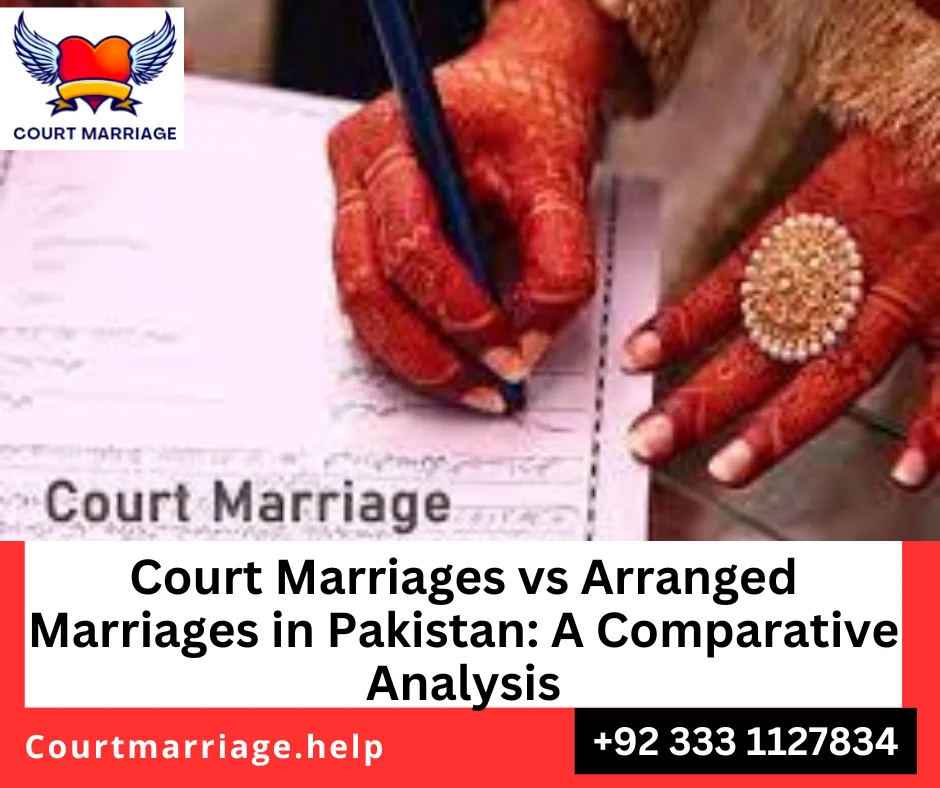
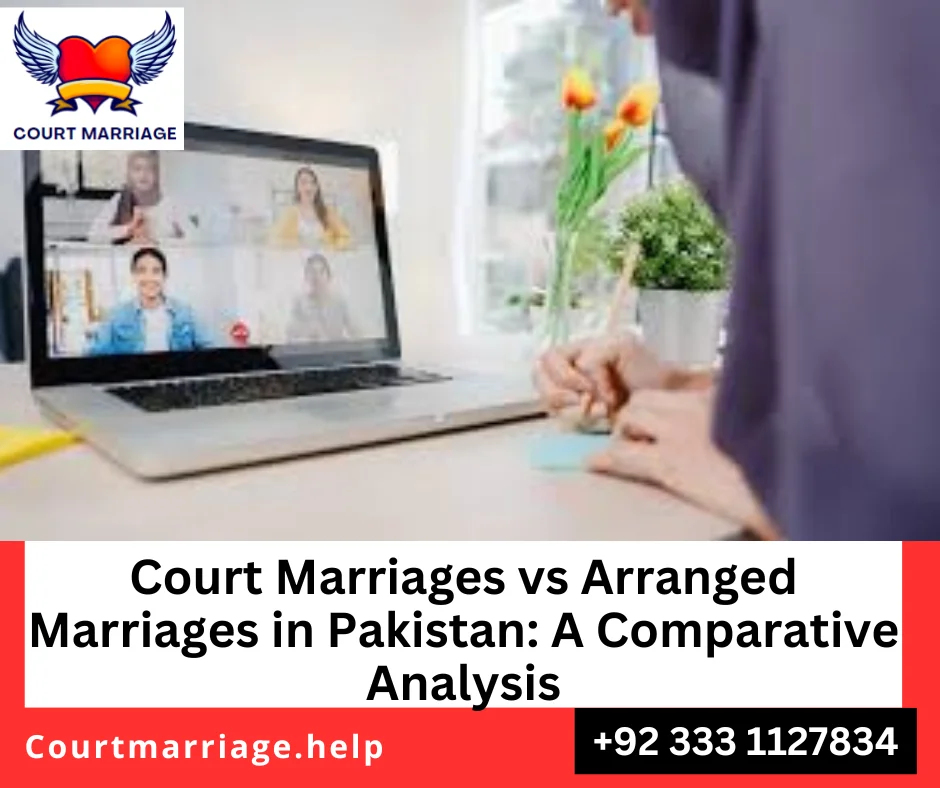
Arranged vs. Court Marriages: Weighing Individual Preferences and Long-Term Goals
The decision-making process for marriage should take into account individual preferences, compatibility, and long-term relationship goals. For some, the assurance of familial involvement present in arranged marriages offers security and stability. For others, the freedom to select a partner independently, afforded by court marriages, is paramount. It is essential to recognize that the evolving nature of marriage practices in Pakistan reflects broader societal changes and the increasing value placed on personal choice.

